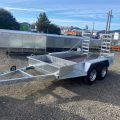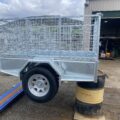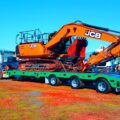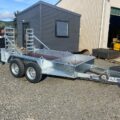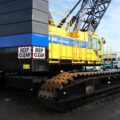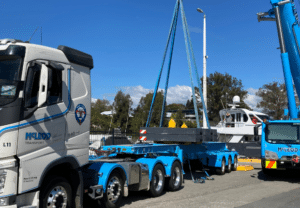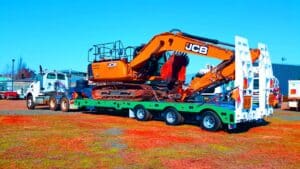Why Trailer Choice Matters in Queensland
In Queensland, the right trailer can make or break a job. From hauling mining gear out of the Bowen Basin, to shifting farm machinery across the Darling Downs, or navigating tight construction sites in Brisbane, your choice of equipment is critical.
Low loader trailers are among the most popular options for heavy haulage. They’re designed to handle oversized and heavy loads, but not every low loader is the same. The best choice depends on what you’re moving, how much it weighs, and the roads you’ll travel.
Let’s look into the different trailer types, compare fixed, widening, and modular options, and explore how each fits into the industries that keep Queensland moving.
Queensland Roads and the Loads They Carry
Heavy haulage in Queensland faces some unique challenges. Out west, you’ll find long stretches of highway where mining and farming loads need to be carried safely over hundreds of kilometres. In the south-east, you’re more likely to deal with busy city streets, sharp turns, and tighter access around construction sites.
The type of load also varies. Mining companies often need to shift oversized machinery, while agriculture relies on moving tractors and harvesters. Construction sites might need deliveries of large equipment or building materials in hard-to-reach spots.
Because of this variety, no single trailer suits every job. That’s why understanding the different low loader designs – and what they’re built for – is so important when planning your transport needs in Queensland.
Common Trailer Types in Heavy Haulage
Let’s take a look at some of the most common heavy haulage configurations for low loaders.
Fixed Low Loader Trailers – Simple and Reliable
Fixed low loaders are the most straightforward option. The deck has a set width that doesn’t change, making them tough, stable, and easy to maintain. They’re a good choice when you’re moving loads that are heavy but not overly wide.
In Queensland, fixed trailers are often used for farming machinery, earthmoving equipment, and other gear that fits comfortably within standard road limits. Because there are fewer moving parts, they usually come at a lower cost and require less maintenance compared to more advanced designs.
The main limitation is flexibility. If your work often involves oversized or unusually wide loads, a fixed trailer may not be the best fit. But for operators who need a reliable, no-fuss option for everyday haulage, they remain a popular choice.
Widening Low Loader Trailers – Built for Bigger Jobs
Widening low loaders offer more flexibility than fixed trailers. Their decks can expand outwards, giving you extra width when you need it. This makes them a strong choice for industries in Queensland that regularly move oversized loads, such as mining and construction.
For example, if you’re transporting wide machinery like dozers or graders, a widening trailer can adjust to fit without needing extra permits for every trip. When the job is done, the trailer narrows back down to standard width, making it easier to travel on public roads.
While widening trailers cost more and require extra upkeep, their versatility often pays off for operators who deal with varied and oversized equipment.
Modular Trailers – Flexibility at Its Best
Modular trailers take things a step further. Instead of being built in one fixed design, they’re made of separate modules that can be connected or configured depending on the job. This design is ideal for extreme heavy haulage, like moving mining plant, large cranes, or infrastructure components.
In Queensland, modular trailers are especially useful in the mining regions up north and inland, where moving massive loads is part of everyday business. They allow operators to build the exact trailer setup they need, whether it’s extra axles for weight distribution or wider decks for oversized equipment.
However, this level of flexibility comes at a price. Modular systems are more expensive, require skilled operation, and need careful planning. They’re not for every operator, but for the biggest jobs, they’re often the only option that works.
Additional Info: Axle Configurations
The number of axles on a low loader directly relates to its load capacity and how it distributes weight. Lets look at some configurations for example:
- Tri-Axle (3×4) and Quad-Axle (4×4) Trailers: More axles mean more points of contact with the road, allowing for a greater load capacity and better stability. A tri-axle setup is suitable for many heavy loads, while a quad-axle is for the heaviest equipment.
- Dolly Options: For extremely heavy loads, a dolly can be added. This is an extra set of axles that connects between the truck and the trailer, or is added at the rear, to further spread the weight and meet legal requirements for gross mass.
Which Trailer Suits Your Needs?
Choosing between fixed, widening, and modular low loaders comes down to the type of work you do most often. If your jobs are mostly the same size and weight, a fixed trailer is simple, reliable, and cost-effective. If you handle a mix of standard and oversized loads, a widening trailer saves time and hassle by adapting to the situation. For the largest and most complex loads, modular trailers give you the flexibility to build the setup you need.
For many operators in Queensland, the decision also depends on where you work. Urban projects may call for smaller, more manoeuvrable trailers, while mining or infrastructure work in regional areas often demands the extra muscle of widening or modular systems.
The key is to weigh up your day-to-day requirements, your budget, and how much flexibility you need for future jobs.
Comparing Options:
| Trailer Type | Best For | Flexibility | Maintenance | Queensland Use Cases |
| Fixed Low Loader | Standard-sized heavy loads | Low – deck width is set | Low – simple design, fewer moving parts | Farm machinery, tractors, harvesters, small earthmoving equipment |
| Widening Low Loader | Oversized machinery and varied loads | Medium – deck width can expand | Medium – extra moving parts require upkeep | Dozers, graders, construction equipment, mixed mining loads |
| Modular Low Loader | Extremely heavy or irregular loads | High – modules can be configured as needed | High – requires skilled operation and planning | Large mining plant, cranes, infrastructure components, very wide or heavy machinery |
Industry Uses and Best Fits
Choosing the right low loader isn’t just about the trailer itself, it’s also about what you’re hauling and where. Different industries in Queensland have different needs, and the trailer that works perfectly in one sector might not suit another.
- Construction: Construction projects often involve moving heavy machinery like rollers, excavators, and graders to tight urban sites. Widening trailers are ideal here because they can handle oversized equipment while still navigating city streets and smaller construction zones.
- Mining: Mining operations, especially in regional areas like the Bowen Basin or central Queensland, often require moving extremely heavy and oversized equipment. Modular trailers are the go-to choice because they can be configured to handle very wide or unusually heavy loads safely.
- Agriculture: Farms across the Darling Downs and out west need reliable, everyday transport for tractors, harvesters, and implements. Fixed low loaders are simple, durable, and cost-effective — perfect for these repeat, standard-sized loads.
- General Freight: Not every job involves massive machinery. Platform trailers and dollies are great for mixed cargo that might include building materials, pallets, or smaller machinery. Their versatility makes them a useful option for operators who need to shift a variety of loads across Queensland.
By matching trailer type to the industry and type of load, operators can save time, reduce wear on equipment, and keep projects running smoothly.
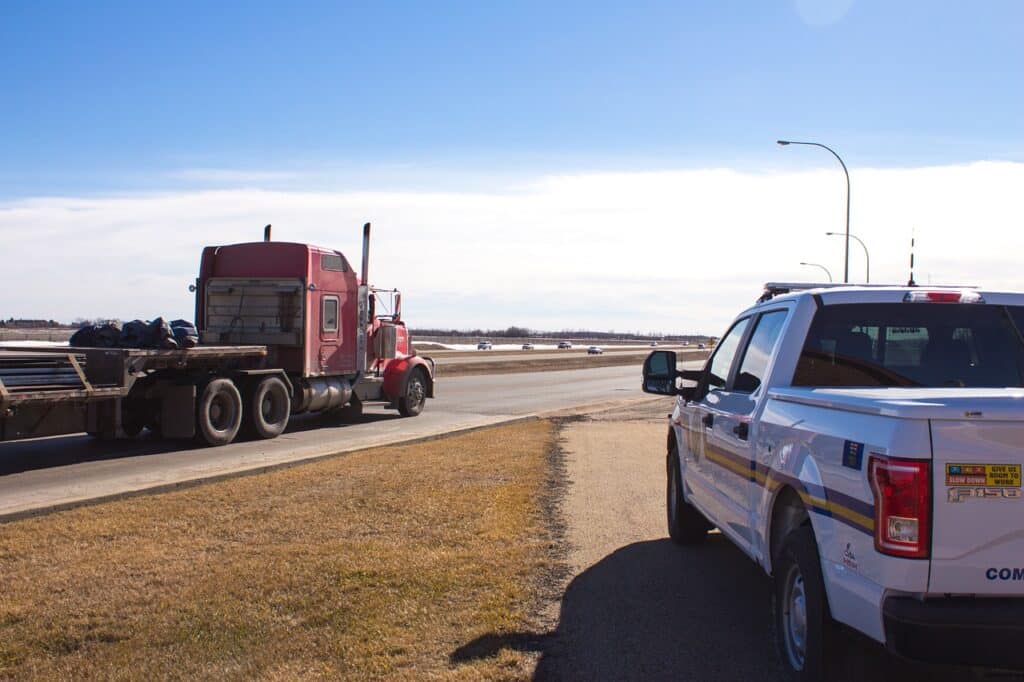
Safety and Compliance in Queensland
In Australia, heavy haulage is governed by strict laws that vary by state and territory, but are generally managed by the National Heavy Vehicle Regulator (NHVR). Operating a low loader, especially with an oversized or overmass (OSOM) load, requires careful planning.
Permits and Regulations:
If your vehicle and load combination exceeds general access limits for mass, length, width, or height, you will be classified as a Restricted Access Vehicle (RAV). This means you will need a permit from the NHVR to travel on specific routes. It’s crucial to understand these rules to avoid heavy fines, prosecution, and significant operational delays.
Chain of Responsibility (CoR):
Australia’s CoR laws mean that every party in the supply chain, from the business that loaded the cargo to the person who receives it, is legally responsible for safety. This includes ensuring your trailer is suitable for the load and that all regulations are met.
Safety Measures
Many modern low loader trailers come with advanced steering systems. These make manoeuvring easier and safer, particularly in tight spaces or on uneven terrain. They also help distribute weight more evenly, reducing stress on the trailer and the road.
Ultimately, no feature or cost saving is worth compromising on safety.
- Load Securing: The load must be properly secured to withstand forces from all directions. This involves using load-rated tie-downs like chains and straps and ensuring they are correctly tensioned.
- Pre-Trip Inspections: Before every journey, the driver must perform a thorough check of the trailer, including tyres, brakes, lights, and all tie-down points.
- Driver Training: Operating a low loader requires specialised skills. Investing in proper driver training, particularly in load restraint and vehicle safety – is not just a best practice, it’s a critical component of risk management and compliance with CoR laws.
Driving the Right Choice Home
Choosing the right low loader trailer is more than just selecting a piece of equipment, it’s about matching the trailer to your work, your loads, and the roads you travel. The right choice can save money, reduce risk, and keep projects moving on time.
Queensland operators should focus on selecting a trailer type that fits their industry needs. Fixed trailers work well for everyday machinery, widening trailers provide versatility for oversized loads, and modular trailers handle the heaviest and most complex jobs. Safety and compliance are equally important, so understanding local regulations, obtaining the correct permits, and managing loads properly are essential.
Long-term value should also guide decisions. Considering factors like maintenance requirements, access to local service, and flexibility for future projects ensures that the trailer continues to deliver efficiency and reliability. By taking the time to choose wisely, operators can protect their equipment and crew while keeping heavy haulage in Queensland running smoothly, no matter the size or complexity of the job.
Looking for more insight on hauling heavy equipment? See our article on picking the perfect all-terrain crane for your needs.

